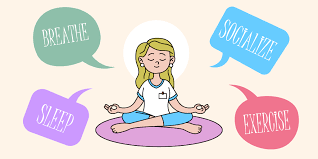Stress management
Stress is a natural part of life and can be caused by a variety of factors, such as work, relationships, or personal issues. While some stress can be beneficial, too much stress can have negative effects on our physical and mental health. Stress management is important to maintain a healthy balance and prevent burnout. In this blog post, we will explore some effective stress management techniques that can help you cope with stress in your daily life.
- Identify the source of your stress
The first step in managing stress is to identify its source of it. This can be difficult as stress can be caused by a combination of different factors. However, by identifying the source of your stress, you can start to take steps to address it. Some common sources of stress include work, relationships, financial issues, and personal problems.
- Prioritize your tasks
One of the most common causes of stress is feeling overwhelmed by too many tasks. To combat this, make a list of everything you need to do and prioritize them by importance. Focus on the most important tasks first, and then work your way through the rest of the list. This will help you feel more in control of your to-do list and reduce the feeling of being overwhelmed.
- Exercise
Exercise is one of the most effective ways to manage stress. Regular physical activity can reduce tension, increase endorphins, and improve overall mood. Even a short workout, such as a brisk walk or a yoga session, can help you feel more relaxed and energized.
- Practice relaxation techniques
Relaxation techniques such as deep breathing, meditation, and yoga can help you feel calmer and more centered. Deep breathing, for example, can help slow your heart rate and lower blood pressure. Meditation and yoga can also help reduce stress and anxiety.
- Connect with others
Social support is essential for managing stress. Spending time with friends and family, or even just talking to someone about your stress, can help you feel more supported and less alone. Joining a support group or a class can also be a great way to connect with others who are going through similar experiences.
- Take a break
It's important to take a break from whatever is causing you stress. Even a short break can help you feel refreshed and recharged. Whether it's going for a walk, reading a book, or listening to music, taking time to do something you enjoy can help you feel more relaxed and better equipped to handle stress.
- Get enough sleep
Lack of sleep can make stress worse. Make sure you are getting enough sleep each night. Aim for 7-9 hours of sleep per night. A good sleep routine can help you feel more rested and better able to handle stress.
- Eat well
Eating a healthy diet can also help you manage stress. Eating a diet high in fruits, vegetables, and whole grains can help you feel more energized and better able to handle stress. Avoiding foods that are high in sugar or caffeine can also help you feel more relaxed.
In conclusion, stress is a part of life, and it is important to find ways to manage it. By identifying the source of your stress, prioritizing your tasks, exercising, practicing relaxation techniques, connecting with others, taking a break, getting enough sleep, and eating well, you can reduce the impact of stress on your life and improve your overall well-being.




Comments
Post a Comment